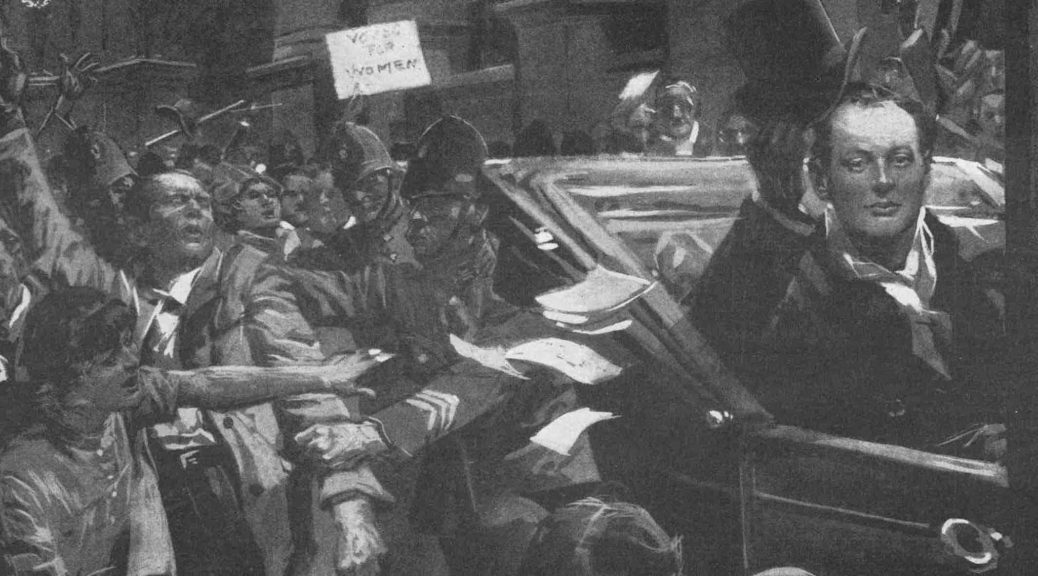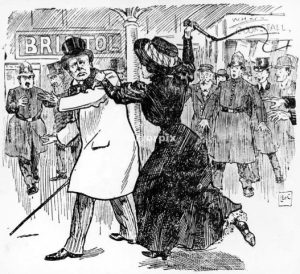
Nashville (3). Churchill and Women’s Rights
Votes for Women, Yeas and Nays
Among the more pernicious distortions of Churchill’s record is that he was a lifetime opponent of rights for women, including their right to vote. Remarks to the Churchill Society of Tennessee, Nashville, 14 October 2017. Continued from part 2….
In 1999 Time magazine explained that Churchill could not be “Person of the Century” because he “bulldoggedly opposed women’s rights.” In 2012 London’s Daily Telegraph wrote: “Churchill believed that women shouldn’t vote, telling the House of Commons that they are ‘well represented by their fathers, brothers and husbands.’”
As I show in my book, Winston Churchill, Myth and Reality, Churchill never said those words, in or out of Parliament. He did write something similar in 1897, a private note when he was 23. Yet as a politician (from 1901 on), he never campaigned against women’s suffrage, and changed his youthful attitude. Today, we would say he “evolved.”
Remember that in 1897, more British women were opposed to suffrage than for it. Neither of Churchill’s parents supported it. His wife Clementine did, and as a young MP, Winston agreed with her. But his support cooled during the 1906 election campaign. Here he encountered the formidable suffrage leaders Christabel and Sylvia Pankhurst.

“Henpecked”
At one rally, Christabel interrupted so frequently that she was hauled into court and fined. Churchill offered to pay her fine; she heatedly refused and spent a week in jail. Young Winston was not amused. “I am certainly not going to be henpecked,” he said. Any more of this, he added, and he would not vote for suffrage in the new Parliament.
He did oppose a 1910 bill extending the vote to female heads of household, but his reason was tactical. As a Liberal, he feared that most of these would be propertied women who voted Conservative. This was quite less than his Prime Minister, Asquith, who opposed votes for women seriatim. In 1928, when Parliament extended the vote to all women over 21, Churchill expressed fear in cabinet that it would increase the Labour vote at the expense of Conservatives. While these may be considered petty objections, a century later some politicians resist immigration reforms they think will increase another party’s vote. Plus ça change, plus c’est la même chose.
Women in War
With the advent of World War I in 1914 domestic arguments, including women’s suffrage and Irish Home Rule, were set aside. In 1918, with Churchill’s support, Parliament passed the Representation of the People Act, enfranchising women over thirty who met minimum property qualifications. Churchill supported this reform, in part because of his observations of the role women had played in the war.
In Churchill’s view, women had been the moral backbone of the country; their work had been vital. They might not have fought in the trenches, but they drove vehicles almost to the front lines, served in field hospitals, took men’s places in war industries. A few served as spies and paid with their lives. That, Churchill wrote, enshrined for them “the vote which for so many years they had vainly sought to wrest from successive Governments by methods too often suggesting that they had not the civic sense to use the privilege rightly.”
Again in World War II, Churchill was deeply moved by the efforts of British women. To his former private secretary, John Colville, he said: “When I think what women did in the war I feel sure they deserve to be treated equally.” Colville recalled the “astonishment” when Churchill said he hoped that Churchill College, founded as a national memorial to him, would admit women on equal terms with men. “No college at Oxford or Cambridge had ever done any such thing,” Colville wrote. “I asked him afterwards if this had been Clementine’s idea. ‘Yes,’ he replied, ‘and I support it.’” He had, indeed, evolved from 1897.
In Sum
When Churchill entered politics in 1900, seven million men had the vote; when he died, thirty-six million men and women had it. In 1945, Churchill cited “the will of the people expressed by free and fair election on the basis of universal suffrage.”
Contrary, then, to the imprecations of Time and others who have not done their homework, Churchill was not against rights of women at any time in the 20th century. His hesitations in 1905-12 arose when militant women tried to break up his speeches. He was against certain measures at certain times, for tactical reasons—unlike, say, Asquith, who opposed the very principle.
Churchill’s support for women’s rights was less ideological than his wife’s, though she was certainly an influence. In part, too, it stemmed from political common sense. In 1945, for example, the Labour margin of victory was 19% among males but just 2% among females. “Papa supported votes for women,” said his daughter, Lady Soames, “when he realized how many women would vote for him.”
World War I…
is another rich source of Churchill mythology. We are told that he bungled the defense of Antwerp in 1914; caused the deaths of thousands in the Dardanelles campaign; steered the Lusitania into the path of a German submarine; wanted America to keep out of the war; and supported the use of poison gas. Every one of these accusations is utter fantasy—including the outrageous allegation that Churchill was hell-bent for war in 1914. Continued in Part 4…
Winston Churchill, Myth and Reality is now available in paperback, with a lower price for the Kindle edition. Click here.







One thought on “Nashville (3). Churchill and Women’s Rights”
Thanks. Very interesting.
Comments are closed.